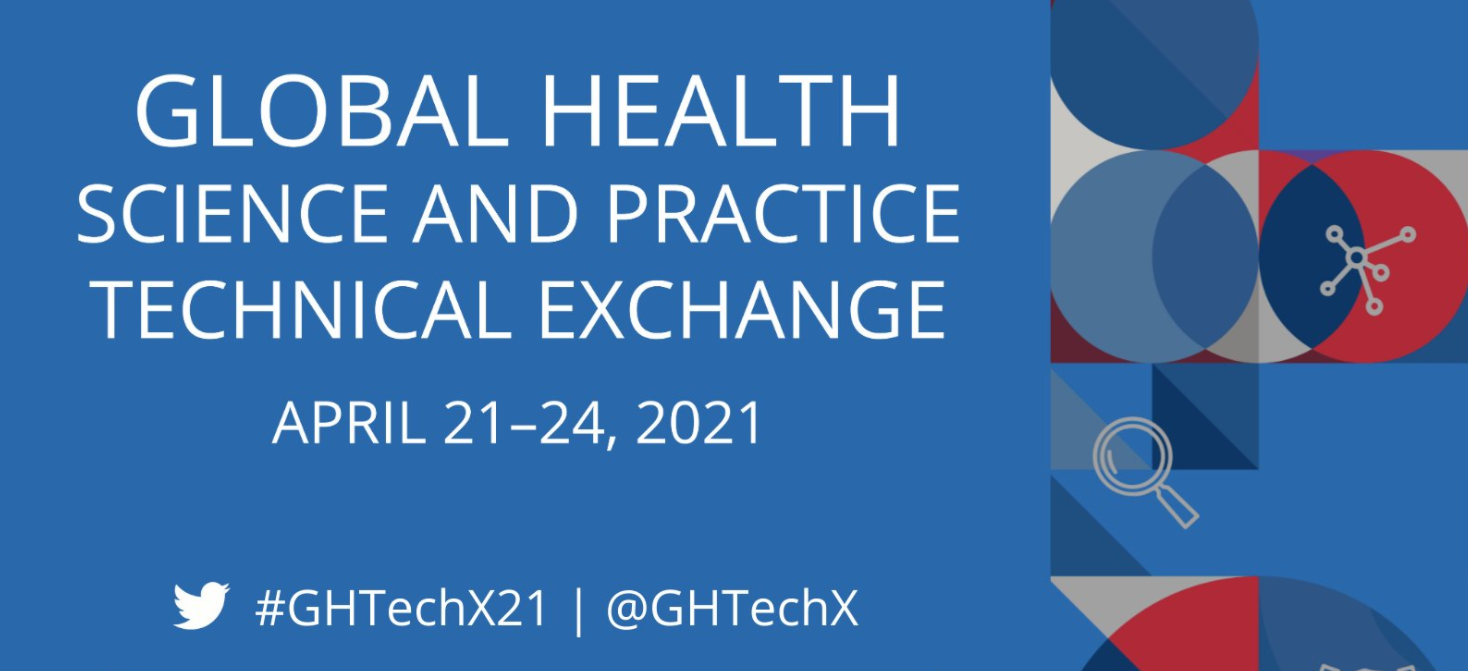MOMENTUM at the 2021 Global Health Science and Practice Technical Exchange
Published on April 16, 2021

From Wednesday, April 21 to Saturday, April 24, 2021, MOMENTUM joined USAID and its partners for the Global Health Science and Practice Technical Exchange (GHTechX). This annual event, hosted by USAID and the Milken Institute School of Public Health at the George Washington University, convened a diverse group of global health researchers, practitioners, and students for sessions highlighting innovative topics, implementation science, and other cutting-edge content.
Staff from four MOMENTUM projects—Country and Global Leadership, Integrated Health Resilience, Knowledge Accelerator, and Safe Surgery in Family Planning and Obstetrics—presented at six sessions throughout the conference. You can access video recordings and summaries of each session below. Please note that you must have previously registered for the conference to access the recordings.
The Silent Burden: Maternal Mental Health
Featuring Patricia Gomez, Senior Maternal and Newborn Health Technical Advisor at MOMENTUM Country and Global Leadership; and Neena Khadka, Newborn Focal Point at MOMENTUM Country and Global Leadership
On April 21, speakers from USAID and MOMENTUM Country and Global Leadership led this session on the impact of poor maternal mental health (MMH) in low- and middle-income countries and its links with poor newborn, infant, and child health outcomes. Data shows that maternal depression and suicide are the leading causes of disease and death among women globally, less than 1% of global health assistance is directed towards addressing mental health. Speakers discussed the global evidence, challenges, and barriers to implementing effective interventions to address maternal mental health and the need to invest in and scale up effective interventions to address common perinatal mental disorders. They also advocated for the need to raise awareness about MMH, prioritize MMH care in policymaking and resource allocation, and integrate MMH throughout health care services so that these common disorders can be identified and treated.
Integrated Health Resilience: Building Better, Building Stronger
Featuring Mesrak Nadew, Resilience Lead at MOMENTUM Integrated Health Resilience
On April 21, Mesrak Nadew, Resilience Lead for MOMENTUM Integrated Health Resilience, shared how the project has expanded health resilience among individuals as well as in households, communities, and health systems. The session explored various pathways to health resilience and the five characteristics of a resilient health system. The session provided examples of ways to deliver integrated services for family planning and reproductive health as well as maternal, neonatal, and child health.
Towards a Fistula-Free Generation: Connecting Women to Knowledge and Care
Featuring Vandana Tripathi, Project Director at MOMENTUM Safe Surgery in Family Planning and Obstetric
sOn April 22, MOMENTUM Safe Surgery in Family Planning and Obstetrics presented results from the Fistula Care and Fistula Care+ projects. Speakers described a comprehensive package of interventions developed by these two projects to reduce barriers to fistula repair in Nigeria and Uganda, including an interactive voice response (IVR) hotline that can screen and refer clients and transportation vouchers. Panelists also discussed strategies to continue this work, such as facilitating better connections to care at the local level and how the media can spotlight fistula care. MOMENTUM Safe Surgery in Family Planning and Obstetrics plans to build on these findings and integrate tools from the Fistula Care projects and the IVR hotline into future work.
Beyond Survival: Improving In-Patient Care to Help Small and Sick Newborns Thrive
Featuring Neena Khadka, Newborn Focal Point at MOMENTUM Country and Global Leadership
MOMENTUM Country and Global Leadership moderated a panel session on April 23 with speakers from USAID Nepal, Save the Children International Nepal, and the Nepal Ministry of Health and Population. The panel shared the bottlenecks, solutions, and opportunities to support newborn health in Nepal and learn from the country’s successes in reducing newborn mortality over the past 20 years. Panelists’ priorities for advancing newborn health in Nepal included focusing on quality of care, strengthening training for community health workers, and creating specialized neonatal nursing cadres to improve the availability of newborn care across the country.
Help Is Just A Text Away: Using Virtual Means to Expand WASH/IPC Facility Readiness
Featuring Julia Bluestone, Health Workforce Team Lead at MOMENTUM Country and Global Leadership
On April 23, MOMENTUM Country and Global Leadership presented lessons from five countries on virtual strategies for expanding health facility readiness for water, sanitation, and hygiene (WASH) and infection prevention and control (IPC) practices. Focused on improving quality and making it easier for facilities to perform best practices, the session highlighted the use of Zoom for virtual quality improvement coaching, WhatsApp for peer support, a Google site for information sharing, and the mWater/Solstice platform for mobile data collection and dashboard.
Adapting Your In-Person Training to a Distance Learning Format? We Can Help!
Featuring Christine Blaber, Project Manager and Distance Learning Specialist at MOMENTUM Knowledge Accelerator; and Reshma Naik, Senior Director for Knowledge Management and Translation at MOMENTUM Knowledge Accelerator
On April 23, MOMENTUM Knowledge Accelerator presented strategies for adapting in-person trainings to blended or distance learning formats at the Global Health Science and Practical Technical Exchange (GHTechX) in collaboration with speakers from India, Senegal, and Ethiopia. The session provided definitions and advantages of these approaches and shared tips from MOMENTUM Knowledge Accelerator’s new resource, Distance and Blended Learning, Part 1: An Overview and Introduction to Assessing Resources, Needs, and Capacities. These reflections and suggestions included using flexible formats to ensure participants could complete training while still meeting other priorities; using “gold” and “silver” certifications to motivate participants to complete the course; considering privacy when deciding whether and when to record a discussion; and fostering strong group dynamics during and between training sessions.

